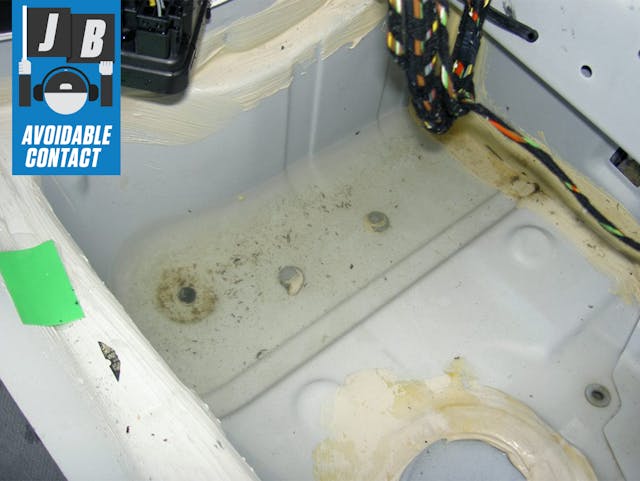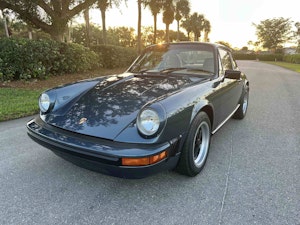Media | Articles
Avoidable Contact #83: “Crossfire!” she cried

The parable goes something like this: A frog and a scorpion sit at the edge of a fast-flowing stream. The scorpion wants to get across. Asks the frog for a lift. The frog replies, “You’re a scorpion. You’ll sting me while you’re on my back.”
“If I do that,” the scorpion replies, “we will both drown, so obviously I won’t do that.” The frog is persuaded by the logic of this. Halfway across the steam, however, the frog feels the unmistakable pinch of a stinger on his back. As the paralysis sets in and he starts to sink, he croaks out:
“Why would you kill us both?” The scorpion’s last reply, as the water washes over his mandibles (OK, there’s a little artistic license going on here, not least of which is the talking amphibians and insects):
“I couldn’t help it! This is who I am!”
Last week I told you a story of how your humble author has often been far too trusting of a person. I have no difficulty admitting this. It’s less pleasant to admit that I have just as often been unworthy of someone else’s trust, that for every time some junkie musician pawned a guitar I lent them there was another time where I promised to pick up a shift at a restaurant and then went to go ride my bike instead. So here’s a tale to complement the one from last week, only this time I’m Fafnir instead of Sigurd, the scorpion instead of the frog.
Marketplace
Buy and sell classics with confidence
Sally loved her outfits. She came from rural Iowa where the teachers said her figure made everyday clothing look suggestive so she learned early to costume herself in flared skirts and extra layers. At her Christian college and at her law school she wore suits during the day, but at night she would shine in vintage dresses and fire-red lipstick. This frightened her already skittish classmates, so she went out into the grownup world alone. When I met her she was a government lawyer who played in an evening kickball league while her private-sector counterparts stayed up late rewriting their briefs. The notion of an adult kickball game fascinated me. She wore a miniskirt and thigh-highs to play. It was more the stuff of adult films than adult kickball leagues and I told her so, at which point she laughed in dismissive but knowing fashion. Sally lived in the guest house of a Northern Virginia mansion owned by some defense-industry heavy hitter. You reached it down a long, curving dirt road that shouted wealth louder with every million-dollar empty acre you crossed along the way. From her bedroom window we might as well have been in the Cherokee National Forest.
For all her tenacity and sharp-eyed wit—as a cub attorney she’d been selected by The Right People for the legal team of a certain now-infamous Marine colonel—Sally was a profoundly innocent person. She supported her feckless adult siblings with material and financial aid, never trading in a car but simply sending it back home for someone’s use. Nobody was ever grateful to her for this. They just opened their beaks wider and demanded more. In the spring of 2010 she subjected her second-generation Grand Cherokee to a comprehensive refurbishment and drove it back to Iowa. Returning to Saarinen’s atheist cathedral afterwards, she called me from the terminal with an idea: she deserved a car of her own, something to keep and enjoy instead of handing it down to people who would frequently call her years after the fact to pay for repairs and complain about wear on the leather seats. “It should be used, and not too expensive. I could get a Porsche like yours,” she said, because she liked my silver Boxster and we had spent many a memorable evening flitting around racetracks and restaurants in it.
“Nobody should have a Porsche like mine, including me,” I replied. “And it has no style, which is deadly for someone like you.” She wanted a car that her friends would be able to recognize from a distance as “Sally’s car.” In truth, I was long past being sick of hearing about her friends. They were universally male, working in the military-industrial complex, movie-star handsome, their tickets punched by acts of overseas derring-do. Perfect families filled with children who sent earnest crayon birthday cards to Aunt Sally. She, in turn, enjoyed the mild scandal of being unmarried and 33 in the midst of all these authentic American heroes. Having a sports car of some type would add a further bit of spice to the mix.
I don’t know how we settled on a Chrysler Crossfire; it might have been because we took a trip once in a Benz SLK and she liked it. The Crossfire, of course, was a Karmann-bodied restyle of the littlest Mercedes droptop, complete with the 3.2-liter V-6 and five-speed automatic from the SLK320. More of a sporting car than an actual sports car, it landed in the marketplace with a sodden thump and set new land speed records for depreciation. Sally had her pick of like-new examples with four-figure odometer readings, all priced well beneath 20 grand. The plan was to use the car for track days at Summit Point, where the Crossfire would be fast enough to stay out of the way of the Miatas but not powerful enough to get her into real trouble. She asked if I’d be responsible for dealing with the Chrysler’s inevitable maladies; she’d read enough on the internet to know there would be problems. It was her shy way of asking if I’d be around for a while. I said yes, knowing it was probably a lie.
As I recall, she paid just over $16,000 for the low-mileage, white Limited coupe. Inside and out it looked brand new, red leather from door to door and all the M-B carryover dashboard parts painted in a delicate metallic silver. Sally already had a dozen dresses that would match the car. Her first few months of ownership were positively rapturous—but then she chanced to leave the “XF,” as she referred to it in texts, outside during a rainstorm. Most steel-roofed cars built after 1925 are fairly immune to rain, but not the Crossfire. It developed a leak in the rear hatch. Most of the interior was soaked. Sally was dismayed by this, as you might imagine. Particularly since the car would no longer start. She asked me to help, but I was tied up—with work, with projects, with someone else I was also seeing and who had a greater, darker claim to my heart than Sally’s modest and occasional automotive co-parenting arrangement. I offered vague reassurances instead of solid advice. She decided to handle it herself.
Over the next year and a half, Sally worked with a strike team’s worth of independent Benz mechanics to make the Crossfire weatherproof, reliable, and usable. I still have in my possession dozens of emails sent to her by the mechanics, then dutifully forwarded to me for a second opinion, stuff that read like this: “So what I was concerned about is that the Body Control Module and the locking pump/CU work together to control the lights and locking. I was worried that all the water in the locking CU could have created an electrical overload and fried the BCM. So I focused on a simple function, the dome lamp. After some faffing around I found that the locking CU was not getting any input from either door … Long story short, it was corrosion (from all the water) in the wiring connectors to the locking CU. So I cleaned that up and now locks and lights seem to work normally.”
This sort of thing happened again and again. Occasionally, while discussing the car’s problems with me, Sally would permit herself a single choked sob. She just wanted the car to work. So she could have the adventures she’d planned for it. So the two of us could see the country in it, together. But it never quite worked. Not long enough to be trustworthy. That was true of the Crossfire, and of me.
Three years later she bought herself a new Wrangler but kept the XF. “I’ll never part with it,” she told me. “It’s our car; we found it together. And you can’t leave me, because I can’t make the car work without your help and advice.”
“Yes,” I replied, “you have two dysfunctional relationships with perpetually broken partners, and they are connected. I see the appeal.” Shortly after that, I proved the sad truth of this offhand remark and we split up for reasons I won’t discuss because they were entirely and completely my fault. I had some personal items I needed to obtain from her and she agreed to leave the garage unlocked for me while she traveled. I rolled the door up and came face to face with the Crossfire. A forlorn puddle of water had formed in both headlights. The paint had started to bubble on those sloppy Karmann body seams. A battery tender sat unplugged next to it; when I opened the driver’s door out of curiosity, the dome lamp didn’t come on. For a brief moment, it occurred to me that all the sins and mishaps of our relationship had somehow been visited upon the car itself, that the secret and hateful abuse we’d given each other had settled into those rusting seams like Oscar Wilde’s story of a rotting portrait. I walked out, rolled the door back down, drove away. I never saw that Crossfire, or Sally herself, again.
Well, that’s not strictly true. Four years ago I saw a picture of her on a Chevrolet dealership’s website, of all places. She was taking delivery of a new Camaro RS. There was no trade-in pictured, but I had no trouble guessing what it must have been. Not long after that, I heard she’d met someone and returned to the Midwest of her youth.
What if the parable goes something like this: The scorpion stings the frog, yes—but he is washed onto the far shore alive, if a bit soggy. The frog floats paralyzed down the stream until someone plucks her out and shakes her off. Maybe there’s a scar from where she was stung. These things don’t always heal the whole way. But she continues nonetheless, a little sadder and wiser.
I like to think of Sally behind the wheel of that burgundy Camaro. I like to think of her pointing it at an open, arrow-straight road reaching to the horizon between two perfect cornfields. A light shove in the back as the engine goes to work, the blurring of the centerline, the future clear and bright in the windshield. Behind her there is nothing but sunbeams defined by dust. And I’d like to think that we can’t hurt people as much as we fear we have. I’d like to think that she left me behind with that sad old Crossfire. You can’t wish too much for something and have it come true. Can’t make a real sports car out of borrowed bits and show-car styling. Can’t make a life with someone who won’t be there for you when you need him. All you can do is find your way out of the corner, straighten the wheel, and apply full throttle. Until you find a companion for all the streams to cross, in whatever time you have left.











